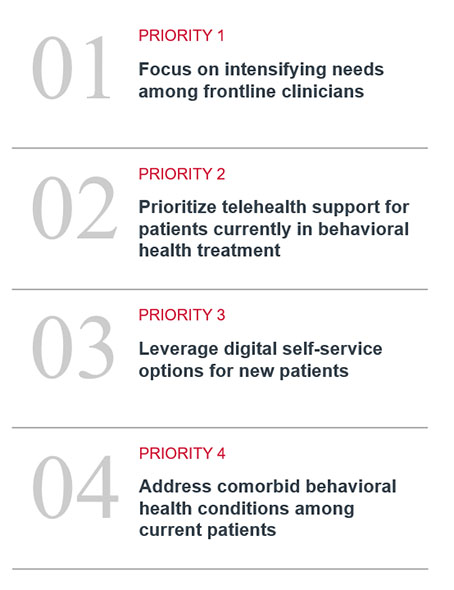Auto logout in seconds.
Continue LogoutIn the wake of the Covid-19 epidemic, more Americans are wearing face masks and people are having a harder time recognizing others' faces—sometimes so much so that their inability to recognize others borders on face blindness, Elizabeth Preston reports for the New York Times.
How Covid-19 will impact behavioral health services
Why we're all getting a little more face blind
According to Erez Freud, a psychologist at the Centre for Vision Research at York University, face recognition is very important—and, with the epidemic, a suddenly very different mental process than it once was.
"We use face recognition in every aspect of our social interaction," he said. "This is something very fundamental to our perception. And suddenly, faces do not look the same."
To dig in on how facial recognition has been changed by the proliferation of face masks, Freud and co-authors conducted a not yet peer-reviewed study involving nearly 500 participants. For the study, the participants were asked to perform a face memory task in which they looked at unfamiliar faces and then attempted to recognize them in increasingly difficult ways. Half of the participants were shown pictures of faces with surgical-style masks that covered the mouth and nose.
According to the researchers, people scored significantly worse on the test when the faces were masked. In fact, a full 13% of participants struggled so much to recognize masked faces that they performed similar to those with prosopagnosia, a neurological condition also known as face blindness that makes it difficult to recognize faces. According to the study, just 3.5% of participants viewing unmasked faces had similarly low scores.
Also weighing in on the phenomenon, researchers at the University of Stirling in Scotland published a study—that has yet to be peer-reviewed—looking at how masks affect facial recognition. They had 138 adults complete face-matching tests online and found that, when masks were superimposed on people's faces, participants performed worse, even if the faces belonged to famous celebrities, Preston reports.
A new process?
According to Preston, this research on facial recognition indicates that recognition isn't a piecemeal process in which we examine other people's faces part by part; rather, recognition happens all at once as people take a glance at another person's face. As a result, wearing a mask can hinder—but not necessarily make impossible—the process, Preston writes.
In fact, research suggests that people rely primarily on the eyes to recognize others, Preston writes, which means it's possible to get an idea of who the individual is and how the individual is feeling emotionally even if the person is wearing a mask.
"A lot of information is conveyed by the eye region," Richard Cook, a psychologist at Birkbeck, University of London, said. "We've still got access to that information."
"We also use other [non-facial] cues, and we can fall back on some of those other cues if they are helpful," Marlene Behrmann, a cognitive neuroscientist at Carnegie Mellon University, said. For example, people may be recognizable by the way they walk or talk, or by their hairstyle or facial hair.
Culture may also influence facial recognition, Preston reports. For instance, research has found people from Egypt and the United Arab Emirates, where women often have their hair covered, performed better at facial recognition when only a person's eyes, nose, and mouth were showing than did British and American participants.
Katsumi Watanabe, a cognitive scientist at Waseda University in Tokyo, has also found differences in the way people in the West identify faces compared with the East. "Western Caucasian people tend to decode facial expressions based on the mouth region, while Eastern Asian tend to use the information from the eye region," Watanabe said.
Overall, however, while people are struggling to recognize faces during this trying time, Cook said, there's a silver lining of sorts: People are appreciating the importance of facial recognition. "They're realizing what it's like to not be able to take it for granted," Cook said (Preston, New York Times, 8/31).

The psychological impact of the Covid-19 pandemic is unprecedented—fear, isolation, distrust. This is rapidly increasing the need for behavioral health services. But thereare significant gaps and barriers that stand in the way of people getting the help they need.
Health systems should prioritize addressing the immediate needs of both staff and patients, especially those with preexisting behavioral health needs or comorbid conditions.
Don't miss out on the latest Advisory Board insights
Create your free account to access 1 resource, including the latest research and webinars.
Want access without creating an account?
You have 1 free members-only resource remaining this month.
1 free members-only resources remaining
1 free members-only resources remaining
You've reached your limit of free insights
Become a member to access all of Advisory Board's resources, events, and experts
Never miss out on the latest innovative health care content tailored to you.
Benefits include:
You've reached your limit of free insights
Become a member to access all of Advisory Board's resources, events, and experts
Never miss out on the latest innovative health care content tailored to you.
Benefits include:
This content is available through your Curated Research partnership with Advisory Board. Click on ‘view this resource’ to read the full piece
Email ask@advisory.com to learn more
Click on ‘Become a Member’ to learn about the benefits of a Full-Access partnership with Advisory Board
Never miss out on the latest innovative health care content tailored to you.
Benefits Include:
This is for members only. Learn more.
Click on ‘Become a Member’ to learn about the benefits of a Full-Access partnership with Advisory Board
Never miss out on the latest innovative health care content tailored to you.
